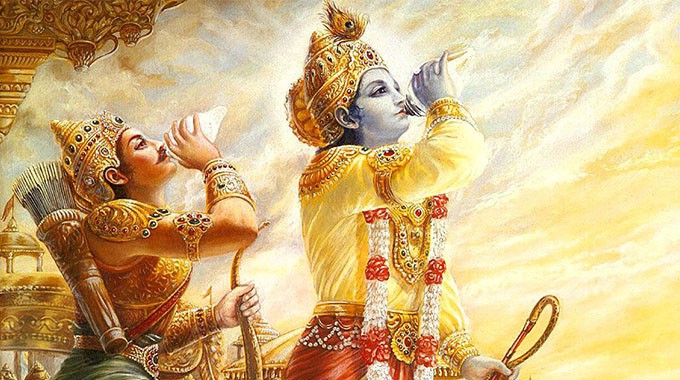(धृतराष्ट्र उवाच।)
धर्मक्षेत्रे कुरुक्षेत्रे समवेता युयुत्सवः।
मामकाः पाण्डवाश्चैव किमकुर्वत सञ्जय ।।१।।
King Dhritarashtra asks, "Sanjay, tell me, what did my sons and the sons of Pandu do when they gathered on the holy battlefield of Kurukshetra, ready to fight?"
Raja Dhritarashtra poochte hain, "Sanjay, batao, mere bete aur Pandu ke bete jab Kurukshetra ke pavitra yuddh bhoomi mein ikatthe hue, yudh ke liye taiyyar ho gaye, toh unhone kya kiya?"
Raja Dhritarashtra ko yuddh ke parinaam ke baare mein jigyasa hai, lekin saath hi apne beton ke liye chintit bhi hain.
Woh andhe hain, na sirf sharirik roop se balki maanak roop se bhi, jo yuddh ke dharm aur adharma ko samajhne ki kami ka pratik hai.
Yeh shlok Bhagavad Gita ka sandarbh set karta hai — ek varta jo mahan Kurukshetra yuddh ke dauran hoti hai, jisme ek pariwar ke do paksh (Pandav aur Kaurav) aapas mein ladne ko taiyyar hain.
Dhritarashtra ka sawaal ek gehra dwandh darshata hai. Jab unke bete (Kaurav) yuddh ki taiyari kar rahe hain, toh woh anishchit lagte hain ki kya hoga, jo aage Gita mein hone wale naitik aur bhavnaatmak sangharshon ka sanket deta hai.
Curiosity and Concern: King Dhritarashtra is curious about the outcome of the battle but also concerned because his sons are involved. He is blind, both physically and metaphorically, symbolizing his lack of insight into the righteousness of the war.
Setting the Stage: The verse introduces the context of the Bhagavad Gita — a conversation during the great battle of Kurukshetra, where two sides of a family (the Pandavas and the Kauravas) are about to fight.
Inner Conflict: Dhritarashtra's question highlights a deeper conflict. While his sons (the Kauravas) are preparing for war, he seems uncertain about what will happen, hinting at the moral and emotional struggles that will unfold throughout the Gita.
